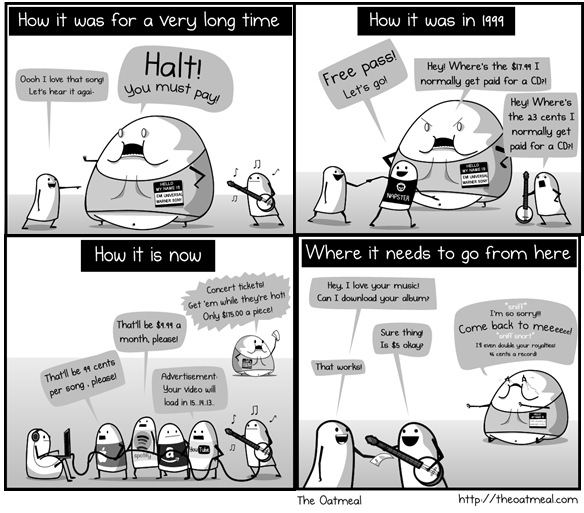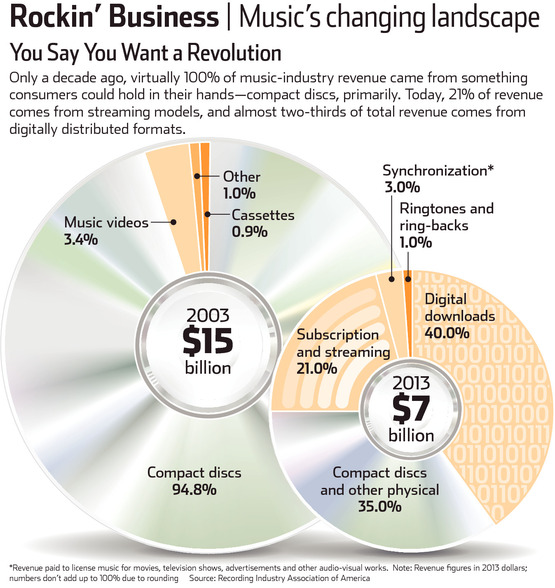 Without a doubt, the last couple of decades have seen the music industry revolutionized; innovation, accompanied by entrepreneurship, has shaped a fluid, dynamic, industry, as opposed to the static one that preceded it. Technological changes stemmi ng from the rise of the internet have transformed the distribution process of music, and further, the entire consumption experience has evolved. As outlined in Owsinski’s article, the “big three” record labels, Sony Music Entertainment, Warner Music Group, and Universal Music Group, have collectively failed to adapt to the shifting landscape of the industry, and consequently, said firms are at present seeing their profits and market share diminish.
Without a doubt, the last couple of decades have seen the music industry revolutionized; innovation, accompanied by entrepreneurship, has shaped a fluid, dynamic, industry, as opposed to the static one that preceded it. Technological changes stemmi ng from the rise of the internet have transformed the distribution process of music, and further, the entire consumption experience has evolved. As outlined in Owsinski’s article, the “big three” record labels, Sony Music Entertainment, Warner Music Group, and Universal Music Group, have collectively failed to adapt to the shifting landscape of the industry, and consequently, said firms are at present seeing their profits and market share diminish.
“For too long the business world has been obsessed with the notion of building a sustainable competitive advantage.” Rita Gunther McGrath contends that in today’s business world, the notion of a sustainable competitive advantage needs to be discarded, replaced by the idea of a transient advantage. Owsinski notes that the major labels felt they held a sustainable competitive advantage, seemingly evidenced by the fact that “they were collecting the most revenue in their history.” However, rather than “reconfiguring” (McGrath), and preparing to exploit the rising popularity of mp3 files, and digitized music as whole, the big three continued to focus on the operational effectiveness of the production and distribution of CDs. The major labels were eventually forced to appear hat in hand before Steve Jobs and buy into iTunes, losing out on revenue shares and giving up control of distribution.
Have the three majors learned their l esson? It would appear so, but only gradually. As the industry shifts towards streaming services, which is supported by the popularity of the smartphone and cellular data, Warner, Sony, and Universal have made their presence known. While late to the party, the big three have expanded their presence on YouTube through “Vevo,” showcasing their artists’ music videos. As well, the labels possess a large ownership stake in Spotify, which is likely headed towards an enormous IPO. At present, the industry seems to be heading towards a “pay-what-you-want”, currently championed by BitTorrent. It remains to be seen how quickly the major labels will identify the trend and reconfigure accordingly.
esson? It would appear so, but only gradually. As the industry shifts towards streaming services, which is supported by the popularity of the smartphone and cellular data, Warner, Sony, and Universal have made their presence known. While late to the party, the big three have expanded their presence on YouTube through “Vevo,” showcasing their artists’ music videos. As well, the labels possess a large ownership stake in Spotify, which is likely headed towards an enormous IPO. At present, the industry seems to be heading towards a “pay-what-you-want”, currently championed by BitTorrent. It remains to be seen how quickly the major labels will identify the trend and reconfigure accordingly.
Mcgrath, Rita Gunther. “Continuous Reconfiguration in the Transient Advantage Economy.” Strategy & Leadership 41.5 (2013): 17-22. Web.
Owsinski, Bobby. “How The Music Industry Created Its Own Worst Nightmares.” Forbes. Forbes Magazine, 7 Aug. 2014. Web. 1 Oct. 2014. http://www.forbes.com/sites/bobbyowsinski/2014/08/07/how-the-music-industry-created-its-own-worst-nightmares/
“The State of the Music Industry – The Oatmeal.” The State of the Music Industry – The Oatmeal. N.p., n.d. Web. 03 Oct. 2014. http://theoatmeal.com/comics/music_industry
